Содержание
- 2. Why do you want to study ‘international law’?
- 3. LAW OF NATIONS (Session 1 & 2)
- 4. STATE RESPONSIBILITY Session 12 & 13 What do you know about responsibilities?
- 5. The meaning of responsibility under international law Responsibility is associated with “obligations”. State responsibility under international
- 6. When a state responsibility/liability arises? A state can incur liability for either “intentional” or “negligent” conduct.
- 7. Fundamental Elements of State Responsibility The existence of a legal obligation recognized by International Law. An
- 8. Hypothetical Case A vessel of Country A passed the territorial water/sea of County B. Suddenly, the
- 9. State Responsibility vs State Sovereignty Can a state that conduct a wrongful act be tried in
- 10. SOVEREIGN IMMUNITY When sovereign immunity applies, one State’s judge cannot assert jurisdiction over another state in
- 11. Equality of States Why does a country have immunity from suit in the courts of another
- 12. The scope of sovereign immunity States Heads of State State government agencies that are conducting State
- 13. Types of Immunity Absolute Immunity A foreign head of State was not subject to any civil
- 14. Restrictive Immunity Most States currently apply some form of the restrictive standard for resolving sovereign immunity
- 15. Make A Hypothetical Case Regarding Absolute and Restrictive Immunity Please Work With Your Partner
- 16. Thank You & See You Again In The Next Sessions
- 17. Thank You & See You In Mid Semester Exam
- 18. Human Rights (Session 15 & 16) What is the meaning of the term “human rights” according
- 19. The Meaning of Human Rights Human rights are those rights possessed by an individual that cannot
- 20. International Bill of Human Rights The 1948 Universal Declaration of Human Rights (UDHR) The 1966 International
- 21. The 1948 Universal Declaration of Human Rights (UDHR) First Category covers “civil and political rights”: The
- 22. The 1948 Universal Declaration of Human Rights (UDHR) Second category consists of economic, social, and cultural
- 23. Is this case against Human Rights? (Indonesian Case) Let’s watch, analyze, criticize and make recommendations regarding
- 24. Two Optional Protocols to the ICCPR The first Protocol is designed to monitor compliance with the
- 25. Two Optional Protocols to the ICCPR The second Protocol is a separate treaty that was designed
- 26. The 1966 International Covenant on Economic, Social, and Cultural Rights (ICESCR) The ICESCR requires state parties
- 27. Human Rights Treaties in Europe The European Human Rights Convention (ECHR) contains civil and political rights
- 28. Latin America’s Human Rights Norms The 1948 Charter of the Organization of American States (OAS). The
- 29. Africa’s Human Rights Program The 1986 African Charter on Human and People’s Rights. The 1986 African
- 30. Thank You & See You Again In The Next Sessions
- 31. Citizenship (Sessions 17 & 18) WHAT IS THE MEANING OF ‘CITIZENSHIP’?
- 32. The Meaning of Citizenship Citizenship (an individual’s nationality) is a bond between an individual and a
- 33. Nationality Nationality is a legal, political, and social link between the individual and the state Nationality
- 34. How is citizenship acquired? Passively by parentage Passively, by being born in a state that considers
- 35. PARENTAGE The child’s citizenship was that of the parents Jus Sanguinis or ‘blood rule’ for establishing
- 36. BIRTH A nationality by birth rule. Jus soli or “soil rule” for determining citizenship. Give your
- 37. Naturalization Individuals may actively change their nationality through the process of naturalization. The national law of
- 38. LAW OF THE REPUBLIC OF KAZAKHSTAN on Citizenship of the Republic of Kazakhstan (with amendments and
- 39. The citizenship of the Republic of Kazakhstan determines the stable political and legal relationship of an
- 40. A citizen of the Republic of Kazakhstan under no circumstances shall be deprived of citizenship, the
- 41. He/she is obliged to observe the Constitution and the laws of the Republic of Kazakhstan, defend
- 42. NEW FORMS OF CITIZENSHIP Citizenship provided by an international organization Citizenship in a borderless world
- 43. ORGANIZATIONAL CITIZENSHIP Early 1974, the Paris Summit of the Heads of States launched a study of
- 44. CITIZENSHIP IN A BORDERLESS WORLD With the advent of the information age, or the electronic world
- 45. DUAL NATIONALITY A dual national possesses the citizenship of more than one nation An individual may
- 46. Unusual Burdens As A Results of Dual Nationality Give your opinions: Jurisdiction Taxes Military service Protection
- 47. STATELESS WHAT DO YOU KNOW ABOUT ‘A STATELESS’ PERSON? CAN YOU GIVE EXAMPLES WHAT CAUSES THE
- 48. STATELESS Individuals are stateless when they lack the nationality of any state. Loss of one’s original
- 49. REFUGEES WHAT IS THE MEANING OF ‘REFUGEES’ ACCORDING TO YOU? Ahmad is a Palestinian who fought
- 50. Refugees under International Law Article 1.A.(2) of the 1951 Geneva Convention on the Status of Refugees:
- 51. Refugees’ Legal Status Under International Law Article 33.1 of the 1951 Convention: A state may not
- 52. Thank You & See You Again In The Next Sessions
- 53. Territory (Session 21 & 22) Why is it significant to determine a state’s territory?
- 54. Categories Of Territory Territory owned by a sovereign state (sovereign territory) Territory capable of being owned
- 55. Sovereign Territory States possess the right to control the land located within their territorial boundaries. The
- 56. Terra Nullius Areas that were deemed terra nullius belonged to no one. They were capable of
- 57. Terra Nullius Was Australia prior to the arrival of Europeans “terra nullius”?
- 58. Res Communis Territory is incapable of ever being legally owned or controlled. It belongs to no
- 59. International law is based on the concept of the state. The state in its turn lies
- 60. The central role of territory in the scheme of international law: =development of legal rules protecting
- 61. Territorial sovereignty remains as a key concept in international law. In international law a change in
- 62. Modes of acquisition Five modes of acquisition are usually detailed: occupation of terra nullius, prescription, cession,
- 63. Accretion [приращение, аккреция (территории, имущества)] This describes the geographical process by which new land is formed
- 64. Cession [передача, цессия, уступка] This involves the peaceful transfer of territory from one sovereign to another
- 65. Conquest and the use of force Normally a state defeated in a war used to cede
- 66. It is, however, clear today that the acquisition of territory by force alone is illegal under
- 67. The 1970 Declaration of Principles of International Law adopted by the UN General Assembly provides that:
- 68. Occupation -is the acquisition of terra nullius. The territory may never have belonged to any state,
- 69. Prescription Like occupation, prescription is based on effective control over territory. The difference between prescription and
- 70. For instance, in the Eastern Greenland case, the Permanent Court of International Justice gave judgment to
- 71. Thank You & See You Again In The Next Sessions
- 72. Dispute Resolution (Session 23 & 24)
- 73. Dispute Resolutions Under International Law Arbitration Diplomacy Judicial Methods (Litigation) Alternative Dispute Resolution WHAT ARE THEIR
- 74. What is arbitration? Please give your opinions
- 75. Arbitration (Non Litigation Dispute Resolution) Parties often determine who will decide what after the dispute arises
- 76. DIPLOMACY The national participants do not submit their disputes for resolution by an “outside” third-party entity.
- 77. Litigation The court composition and power to act are established before the dispute arises.
- 78. Alternative Dispute Resolution (ADR) Negotiation: is completely controlled by the immediate parties to the dispute. Negotiations
- 79. International Dispute Resolutions (Discussions) Your country breaches International Law. Which dispute resolution methods you prefer? Arbitration,
- 80. Arbitration Ad hoc Arbitration: there are no pre-established rules and procedures predating the agreement to arbitrate.
- 81. ARBITRAL ENTITIES AND TRIBUNALS
- 82. The Permanent Arbitral Entities The Permanent Court of Arbitration: is not a court. Its judges serve
- 83. Courts The Permanent Court of International Justice (the first World Court): resolves disputes between states materialized
- 84. The International Court of Justice (ICJ) The ICJ hears cases referred to it as follows: As
- 85. International Criminal Court (ICC) The ICC try individuals accused of the following: Genocide, as defined in
- 86. Ad Hoc International Criminal Tribunals The Nuremberg and Tokyo Tribunals in 1945 (Germany and Japanese war
- 87. REVIEW MATERIALS 15 - 24 Sessions 15 & 16: Human Rights Sessions 17 & 18: Citizenship
- 88. FINAL EXAM CLUES The concept of jus soli and jus sanguinis How to determine that some
- 89. Thank You & See You In Final Semester Exam Good luck!!!
- 90. MID SEMESTER EXAM Anggora is a new independent State located in Zip Continent. There are 5
- 91. MID SEMESTER EXAM Questions: Has this case to be decided under a State national law or
- 92. FINAL SEMESTER EXAM CASE I: Gallan was born in Alpha country which applying ‘jus soli’ rule,
- 93. FINAL SEMESTER EXAM Questions: Mention all of the issues and analyze them based on International Law
- 94. FINAL SEMESTER EXAM The ICJ has been criticized for its effectiveness. It was formed within a
- 95. Final Test Exam (make up exam) Sudan has the largest number of Internally Displaced People in
- 96. FINAL TEST EXAM (Make Up Exam) There is no territory on earth that is totally incapable
- 98. Скачать презентацию





























































![Accretion [приращение, аккреция (территории, имущества)] This describes the geographical process by which](/_ipx/f_webp&q_80&fit_contain&s_1440x1080/imagesDir/jpg/380538/slide-62.jpg)
![Cession [передача, цессия, уступка] This involves the peaceful transfer of territory from](/_ipx/f_webp&q_80&fit_contain&s_1440x1080/imagesDir/jpg/380538/slide-63.jpg)




















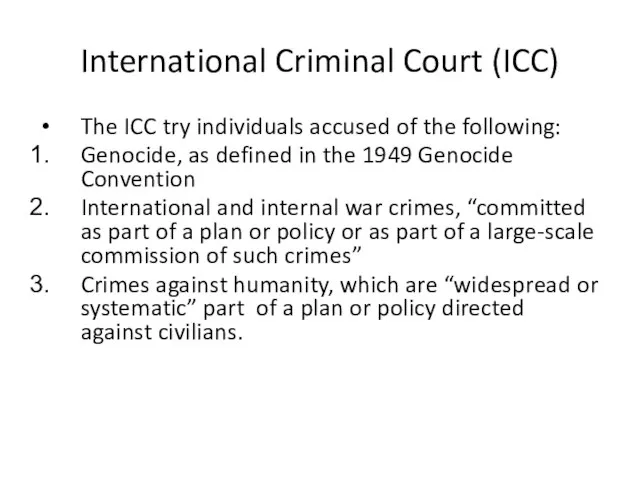

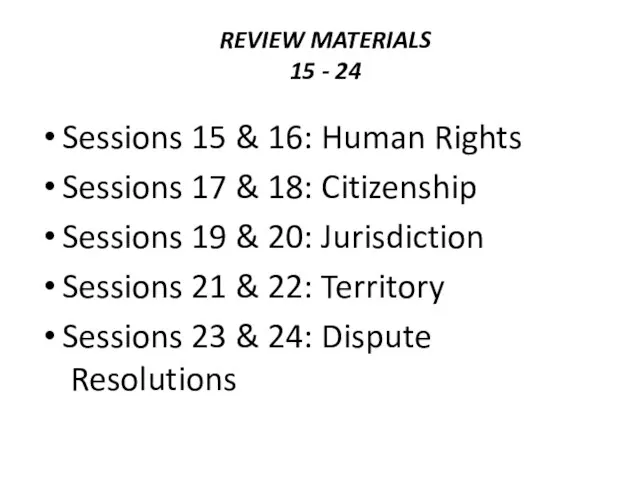
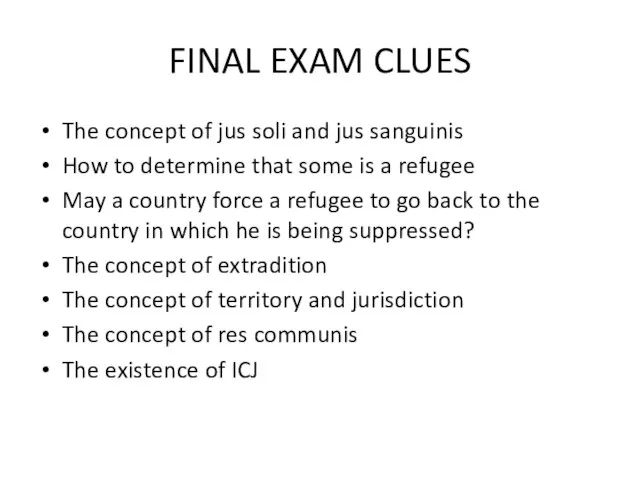

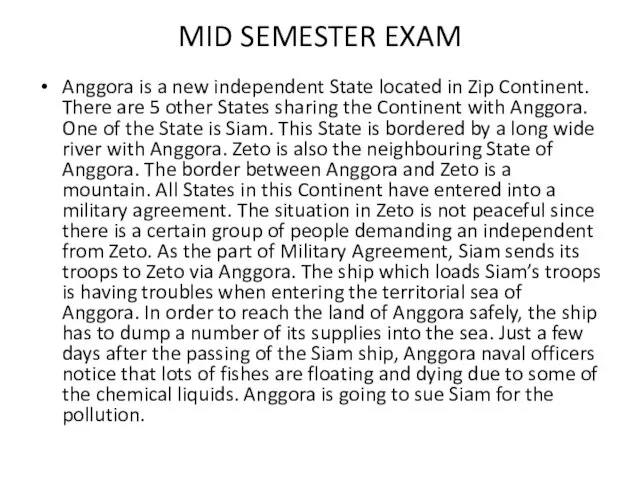
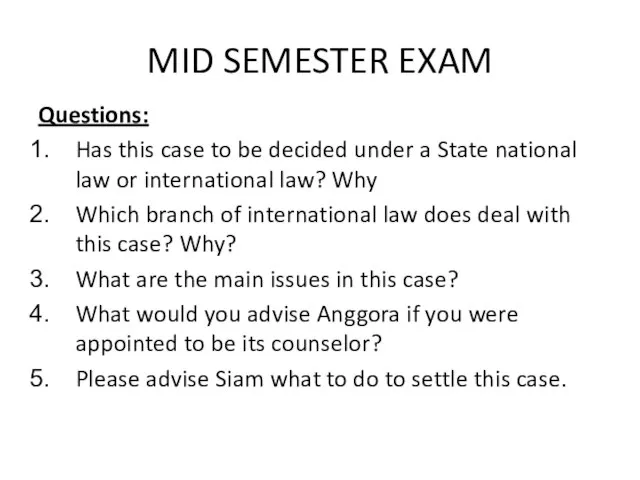
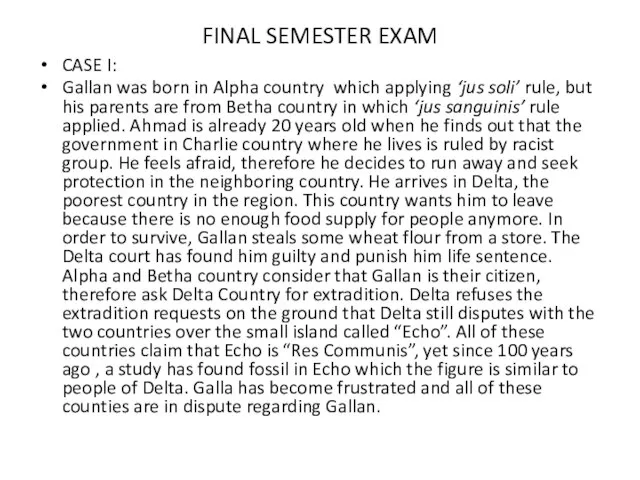
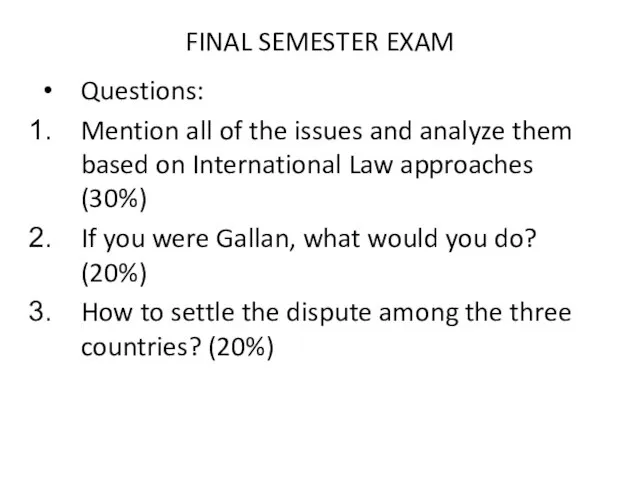
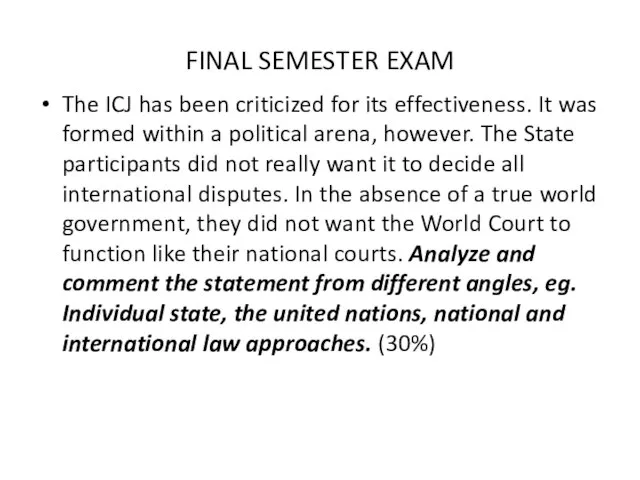
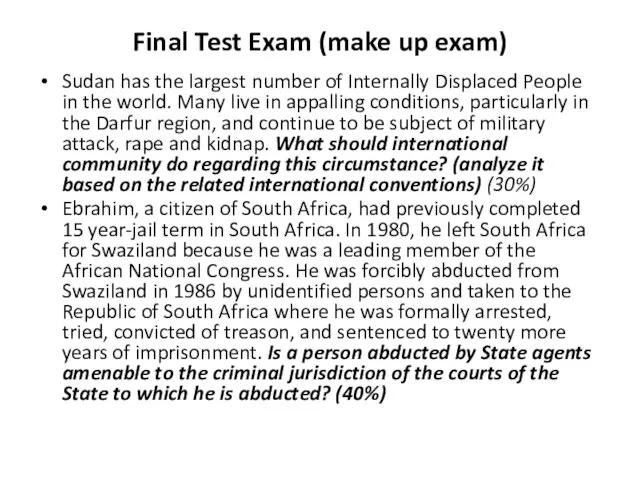
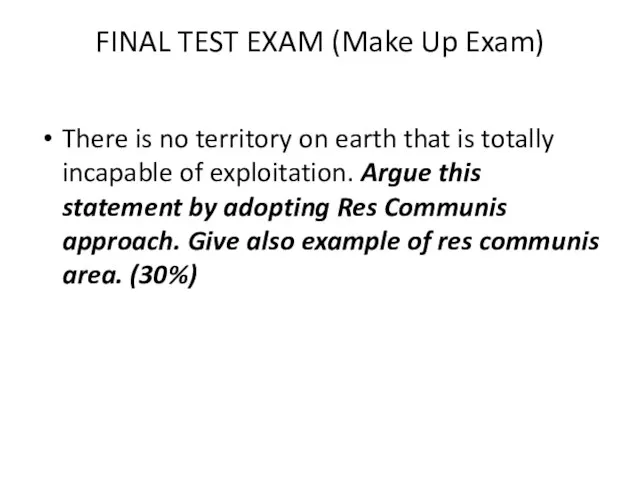
 Добро пожаловать!!
Добро пожаловать!! Презентация на тему Рынок недвижимости и особенности его функционирования
Презентация на тему Рынок недвижимости и особенности его функционирования  Использование личностно-ориентированных здоровьесберегающих образовательных технологий на уроках географии
Использование личностно-ориентированных здоровьесберегающих образовательных технологий на уроках географии Прошу дождя
Прошу дождя В поисках истины и красоты
В поисках истины и красоты металлургический комплекс
металлургический комплекс Особенности организации и проведение спартакиады
Особенности организации и проведение спартакиады Франко-прусская война и создание Германской империи
Франко-прусская война и создание Германской империи Плакатное искусство в годы Великой Отечесвенной войны
Плакатное искусство в годы Великой Отечесвенной войны Методики использования новых возможностей конфигурации «Управление торговлей»
Методики использования новых возможностей конфигурации «Управление торговлей» Изменения в ТК РФ
Изменения в ТК РФ Презентация на тему Черные дыры
Презентация на тему Черные дыры  Презентация на тему Влияние человека на природу Экологический кризис
Презентация на тему Влияние человека на природу Экологический кризис  Проекторы Casio. Ключевые преимущества. Линейка оборудования
Проекторы Casio. Ключевые преимущества. Линейка оборудования Время
Время Профессия актёр
Профессия актёр Бобры
Бобры Общие требования к разработке бизнес-планов для получения государственного финансирования
Общие требования к разработке бизнес-планов для получения государственного финансирования Бизнес-план. Салон-парикмахерская Модница
Бизнес-план. Салон-парикмахерская Модница Комплексное предложение по видеонаблюдению
Комплексное предложение по видеонаблюдению мишень для дротиков
мишень для дротиков Деловая графика в MS Excel
Деловая графика в MS Excel Геофизические исследования скважин
Геофизические исследования скважин График функции
График функции Виды пряжи
Виды пряжи ТЕРЕМОК Сказка Теремок 900igr.net Стоит в поле теремок, он ни низок, ни высок.
ТЕРЕМОК Сказка Теремок 900igr.net Стоит в поле теремок, он ни низок, ни высок. Финно-угры, ты и я…
Финно-угры, ты и я… Статистика по ДТП, работа комиссии по расследованию происшествий и последствия серьёзных происшествий
Статистика по ДТП, работа комиссии по расследованию происшествий и последствия серьёзных происшествий